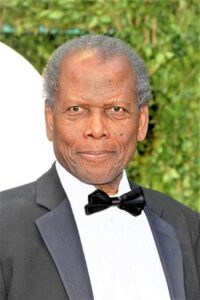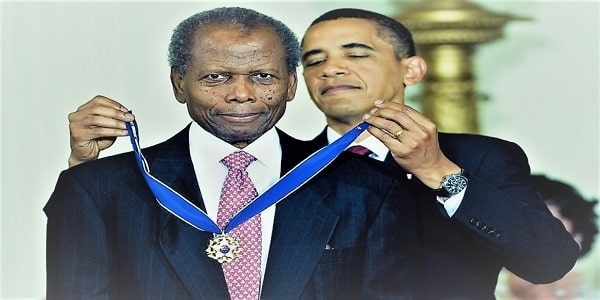Sidney Poitier (Born on February 20, 1927, in Florida, U.S.)was an American actor, film director, diplomat, and the first black male Oscar winner for the Best Leading Actor, also recognized as the first black movie star. Poitier served as the Bahamian Ambassador to Japan from 1997 to 2007.
In 1963, Poitier became the first black actor to win the Oscar for Best Actor with his performance in the movie “Lilies of the Field”. In 1999, the American Film Institute selected Poitier as a finalist in American Film Institute 100-year-old star and ranked 22nd among 25 male actors.
Poitier has directed some popular films like Stir Crazy, Fast Forward, Hanky Panky, Ghost Dad, and Buck and the Preacher. In 2002, 38 years after he won the Oscar for Best Actor, Poitier won the Oscar for Lifetime Achievement awarded by the Academy of Motion Picture Arts and Sciences for his extraordinary expressiveness.
He is also the Bahamas Ambassador to UNESCO. On August 12, 2009, Sidney Poitier was awarded the Presidential Medal of Freedom from President Obama, which is the highest honor for American civilians.

Facts About Sidney Poitier
- Born: February 20, 1927 (age 94), in Miami, Florida, U.S.
- Known For: His acting in the movie (Lilies of the Field)
- Height: 1.89 m
- Occupation: Actor, director, ambassador
- Citizenship: Bahamian, American
- Religion: Christianity
- Father: Reginald James Poitier
- Mother: Evelyn Poitier
- Spouse(s): Juanita Hardy (m. 1950; div. 1965), Joanna Shimkus (m. 1976)
- Children:
Sydney Tamiia Poitier
Anika Poitier
Pamela Poitier
Beverly Poitier-Henderson
Gina Poitier
Sherri Poitier - Net Worth: $25 million
- Quotes: But my dad also was a remarkable man, a good person, a principled individual, a man of integrity.
Early Life of Sidney Poitier
Sidney Poitier was born in Miami, Florida, where his Bahamian parents were visiting. The Poitiers grew up on the Island In the Caribbean, then resided in Miami, where his parents, Reginald James Poitier and Evelyn Poitier, traveled to sell tomatoes and other products of the farm on the Cat Island.
Poitier was born two months premature and the baby’s hopes of survival were slim, so his parents stayed in the United States for 3 months. to take care of him. Thus the actor automatically received American citizenship.
At the age of 10, his parents moved to Nassau in the Bahamas at the age of 15, his parents sent him to Miami to live with his brother. At the age of 17, he moved to New York where he worked as a washerman.
With the help of a Jewish waiter who sat with him every evening, he learned to read the newspaper. Later he decided to be classified in the US Army and was fired when he spent a successful hearing through which received a job in the American Negro Theater.
A Career as an Actor
In 1946, Sidney Poitier made his debut as a lead role in the play Lysistrata (based on the comedy of the same name by Aristophanes) on Broadway, which gave him good reviews. There, her manager noticed him 20th Century Fox, Daryl F. Zanuck, who hired him to star in Joseph L. Mankiewicz’s film No Way Out (1949) as a doctor threatened by a white man played by Richard Windmark.
His performance led him to more roles, most of which were notable, than those offered to other African-American actors of the period. He established himself with his role in the film Blackboard Jungle (1955), where he appeared as a student of an incompetent class alongside Glenn Ford.
The Poitier was the first African-American actress who was nominated for an Oscar for Best Actor for his film 1958 When we broke the chains (The Defiant Ones). He was also the first actor to win the award (for the film Lillies of the Field (1963).
(They had preceded the awards of Hattie McDaniel who won Oscar Supporting Actress for the film Gone with the Wind (Gone With the Wind, 1939) and James Basketball received an honorary Academy Award for his performance in the film of Disney Song South (Song of the South).
Despite his victory, Poitiers feared that the film industry’s only award granted to impress the crowds and to prohibit the biggest and most important requirements in the future. The year after his victory, he worked hard and remained the only African-American actor in Hollywood to be successful, but the roles offered to him were indifferent.
In 1967 proved the busiest of the year with three films to be the most popular of the year: Story of a Crime (In the Heat of the Night), Guess Who Come Night (Guess Who’s Coming to Dinner), and To Our Lord with Love (To Sir, with Love). In The Crime Story, he landed one of his most popular roles as police officer Virgil Tibbs.

